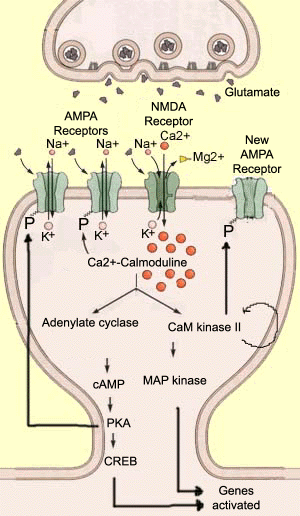Nytimes: News Source
March 9, 2007
Study Uncovers Memory Aid: A Scent During Sleep By BENEDICT CAREYScientists studying how sleep affects memory have found that the whiff of a familiar scent can help a slumbering brain better remember things that it learned the evening before. The smell of roses — delivered to people’s nostrils as they studied and, later, as they slept — improved their performance on a memory test by about 13 percent.The new study, appearing today in the journal Science, is the first rigorous test of the effect of odor on human memory during sleep. The results, whether or not they can help students cram for tests, clarify the picture of what the sleeping brain does with newly learned material and help illuminate what it takes for this process to succeed.
Researchers have long known that sleep is crucial to laying down new memories, and studies in the 1980s and ’90s showed that exposing the sleeping brain to certain cues — the sound of clicking, for instance — could enhance the process. But it is only in recent years that scientists have begun to understand how this is possible.
“The idea didn’t get any traction with scientists back then, because it didn’t make sense,” said Dr. Robert Stickgold, an associate professor of psychiatry at Harvard, who was not involved in the research. The new study, Dr. Stickgold added, “shows not only that sleep is important for declarative memory, but also allows us to look at exactly when and how this process might happen.”
In the study, neuroscientists from two German institutions, the University of Lübeck and the University Medical Center Hamburg-Eppendorf, had groups of medical students play a version of concentration, memorizing the location of card pairs on a computer screen. Upon learning the location of each pair, the students received a burst of rose scent in their noses through masks they wore. The researchers delivered the fragrance in bursts because the brain quickly adjusts to strong smells in the air and begins to ignore them.
The students went to sleep about a half-hour later, with electrodes on their heads tracking the depth of their slumber. Neuroscientists divide sleep into stages, including deep (or slow wave) sleep and the shallow, dream-rich state called rapid eye movement (or REM) sleep.
The brain is thought to process newly acquired facts, figures and locations most efficiently in deep sleep. This restful state usually descends within the first 20 minutes or so after head meets pillow and may last an hour or longer, then recur once or more later in the night. The researchers delivered pulses of rose bouquet during this slow-wave state; the odor did not interrupt sleep, and the students said they had no memory of it.
But their brains noticed, and retained an almost perfect memory of card locations. The students scored an average of 97 percent on the card game, compared with 86 percent when they played the game and slept without being perfumed by nighttime neuroscience fairies.
The students did not get the same boost when they received bursts of the fragrance just before sleep or in REM sleep rather than in deep slumber, and their improvements were not due to practice, the study found.
The study’s results could eventually help doctors improve patients’ memory by devising treatments directed at deep sleep. As they age, people spend less and less time each night in such sleep, and existing sleep medications do not generally increase it. But pharmaceutical companies are investigating compounds that do so.
Previous research has shown that regions of the cortex, the thinking and planning part of the brain, communicate during deep sleep with a sliver of tissue deeper in the brain called the hippocampus, which records each day’s memories. What is most likely happening in that communication, the study’s authors argue, is that the cortex is telling the hippocampus to reactivate the same neurons that fired when a particular fact was noticed or learned. The hippocampus does so, encoding the firing sequence in the cortex and thereby consolidating the memory.
“We would expect spontaneous reactivation driven by the slow-wave sleep, but by presenting the rose odor cues we intensified this activation and enhanced the transfer of these memories,” said Dr. Jan Born, a neuroscientist at Lübeck who undertook the study with Björn Rasch, Christian Büchel and Steffen Gais.
Olfactory sensing pathways in the brain lead more directly to the hippocampus than do visual and auditory ones. That may be why smells can so vividly revive things past like forgotten joys or humiliations.
To check their reasoning, the researchers took M.R.I. images of some of the students’ brains during their rose-scented slumber. As expected, regions of the cortex became noticeably more active, as did the hippocampus.
The findings suggest that distinct sleep states may be specialized to integrate different kinds of information. For example, the researchers found that the rose scent did not enhance memories of a learned finger-tapping sequence — a rhythmic memory that does not appear to be consolidated by the hippocampus.
Likewise, given that the rose fragrance during REM sleep made no difference to the students’ scores, it may be that the hues, horrors and hilarity of dreams during REM reflect the brain’s efforts to integrate emotional, rather than factual, memories, said Dr. Stickgold, of Harvard.
“Extracting patterns and rules and what we call the gist of a memory might turn out to be antithetical to the process of nailing down the facts themselves,” Dr. Stickgold said. “So, for instance, you might use REM to integrate one, and slow-wave sleep for the other.”
The new findings hardly close the book on how memories are formed and consolidated during sleep. Other scientists have found evidence that rather than reactivation, the brain’s slow-wave state induces an overall weakening of neuron-to-neuron signaling, making recently recorded memories look bolder by reducing the background neural “noise.” And it may be, Dr. Born said, that both processes are occurring during sleep: a pruning away of the noise of the day’s irrelevant observations, and a replaying of its important ones.
Either way, the researchers said, the new findings are likely to prompt some creative thinking on the part of students facing the terror of final exams. (The German research group has preliminary evidence that acrid smells may be even better in enhancing memory.)
“We use an apparatus to sense the onset of slow-wave sleep and deliver the odor” in short, alternating bursts, Dr. Born said, adding, “I suppose for some students it would not be too difficult to develop something like this.”
That’s what engineering departments are for.
Copyright 2007 The New York Times Company
























































